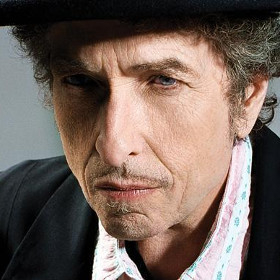Michael Coveney: Bob Dylan and other mystical mysteries in Kilburn
Dylan, now 72, has returned to London for a series of concerts at the Albert Hall

I was once a Catholic – I mean, of course, I was once a practising Catholic – so in preparation for the revival of Mary O'Malley's 1977 play, Once a Catholic, I thought I'd better put some metaphorical money in the collection box. I have drawn the line at getting down on my knees, fiddling with my rosary beads or going inside a church, but I have visited my mother and gone to hear Bob Dylan.
I'm not a massive Bob-ophile, but I do think he's a great poet, and his spellbinding performance in the Royal Albert Hall last night was wrapped in mystery and, well, mysteriously rapt. I didn't recognise one single song – most of the two-hour set was taken from his latest album, Tempest – but I did recognise his peerless musical authenticity (a blues rock folk amalgam at once nostalgic and contemporary), his spiritual fervour and his extraordinary phrasing and poignantly melodic sprechtgesang.
There is no "glad to be here" backchat with Dylan. He comes on, sings, backed by a very good, tight band, and goes away again. Mostly, he sits at the piano. When he stands at the front of the stage he does so in a foursquare, unassuming way, as though he's just got down from a horse and his legs have slightly buckled and then set, like concrete pincers. Very occasionally he sucks on the old harmonica. You cannot understand a single phrase of what he's saying/singing, but the voice is more gravelly than whiney, and his subjects are life, death, love, longing and getting through the night. I think. It's utterly mesmerising.
Dylan's only 72, which seems young for a rock star these days, and his audience has grown old with him and stuck very close. Milling around South Kensington in the late afternoon they were comparing notes on the recent album and renewing acquaintanceship from other concerts in Milan and Glasgow – Dylan has been on a "never ending tour" for several years now. These are hard-core quality music fans, not left-over hippies or even ageing rockers.
Quite a few of them, like me, took the opportunity of dropping into the Natural History Museum – checking out the dinosaurs and mineral deposits seemed an appropriate diversion in the circumstances – and enjoying the seasonal setting of the adjacent ice-rink and fairground stalls; there's a lovely new bar out there, too, serving cakes and mulled wine.
These fans are quietly worshipping at Bob's altar, and have done so for some time. Inside the Albert Hall, I bumped into only one person I recognised, the novelist Will Self, and one person I knew, the theatrical photographer, John Haynes. The lady on my left in the stalls was making a few notes, but she resembled a maiden aunt from Tunbridge Wells, not a rock critic.
My Bob Dylan, of course, as for most people of my generation, is the poet of protest and social unrest, but his work has also attracted some wonderful critical writing from the likes of Robert Shelton and my old tutor Christopher Ricks, a lifelong admirer. And one of the best rock music books ever is The Rolling Thunder Logbook, an account of a 1975 tour through north east America, on which Sam Shepard accompanied Dylan, his band, Joan Baez and Allen Ginsberg with a film of the trip in mind.
The film never happened, but the logbook's an unpretentious masterpiece (one of its best lines, "I'm so horny not even the crack of dawn is safe," has been lately filched and re-worked by Barry Humphries as Sir Les Patterson at the Palladium). Dylan has been a recording artist for 50 years, and I'm now convinced I should catch up with some of the stuff I've been missing.
Mary O'Malley's Once a Catholic is set in a convent school in Willesden, north London, in 1956, the year of the Suez Crisis and Look Back in Anger. A lot has happened in the Catholic church since – and not just to the liturgy or the strict isolationism of faith in pre-Pope John XXIII and Vatican Council times; people at large, outside the church, think of it more now as a seedbed of child abuse, hypocritical homophobia and all manner of political corruption.
Was a knockabout comedy like Once a Catholic anticipating such a development? We shall soon find out. One thing for sure, though: while O'Malley has written several other plays, she remains best known for this one, just as Shelagh Delaney is best known for A Taste of Honey and Marie Jones for Stones in His Pockets; and both of those plays are being revived in the new year, too. Rock on, ladies; your one-hit wonders are just as deserving of a second hearing as the indestructible genius of Bob Dylan.












